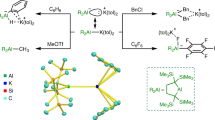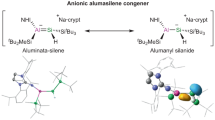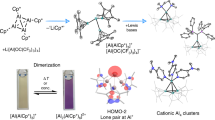Abstract
GENERAL methods for preparation of organo–tin compounds of divalent tin have been reviewed by Gilman et al.1. The most usual methods include reaction of stannous chloride with a Grignard reagent or lithium alkyl and reduction of a dialkyl tin IV dichloride with sodium amalgam. In addition, reaction of sodium triethoxyl-alumino hydride with organo–tin IV halides in certain circumstances leads to formation of divalent organo–tin compounds2.
This is a preview of subscription content, access via your institution
Access options
Subscribe to this journal
Receive 51 print issues and online access
$199.00 per year
only $3.90 per issue
Buy this article
- Purchase on Springer Link
- Instant access to full article PDF
Prices may be subject to local taxes which are calculated during checkout
Similar content being viewed by others
References
Ingham, R. K., Rosenberg, S. D., and Gilman, H., Chem. Rev., 60, 459 (1960).
Schnitz-Dumont, O., and Bungard, G., Chem. Ber., 92, 2399 (1959).
Chem. Abstracts, 53, 9061 (1959).
Brit. Patent, No. 802, 796.
Krause, E., and Becker, R., Ber., 53, b, 173 (1920).
Author information
Authors and Affiliations
Rights and permissions
About this article
Cite this article
SMITH, T. Reaction of Di-isobutyl Aluminium Hydride with Stannic Chloride. Nature 199, 374–375 (1963). https://doi.org/10.1038/199374a0
Issue Date:
DOI: https://doi.org/10.1038/199374a0
Comments
By submitting a comment you agree to abide by our Terms and Community Guidelines. If you find something abusive or that does not comply with our terms or guidelines please flag it as inappropriate.



